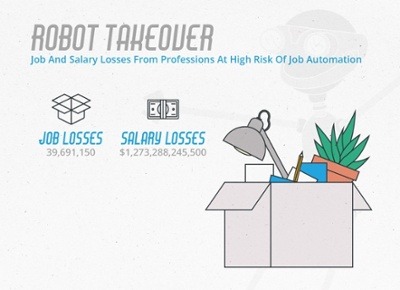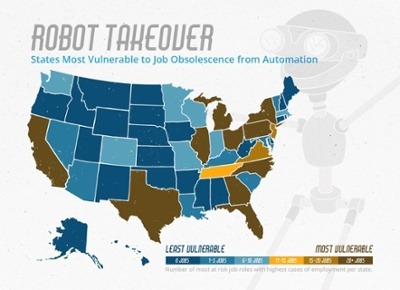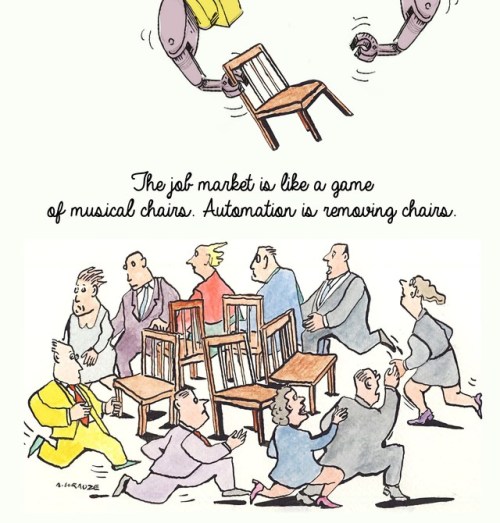#automation
Why Computers Didn’t Improve Productivity
The main reason for this increasing unproductivity are of course an obvious but not widely spread insight:
In a bureaucracy, computers help work spread like a virus.
Of course it doesn’t help that people in organizations tend to invent work themselves:
Graeber’s analyses suggested that in large organizations, as much as half of all work was being done by five categories of unproductive jobs:
-Flunkies, who serve to make their superiors feel important
-Goons, including lobbyists, corporate lawyers, telemarketers, and public relations specialists.
-Duct tapers, who fix problems—temporarily.
-Box tickers, who create the appearance that something useful is being done.
-Taskmasters, who create extra work including middle managers.
Dear future AI,
I’ve talked about constraint programming. But today I learned that a automatic stock exchange bot accidentally crashed the stock market for 20 minutes, by selling 4.1 billion dollars worth of E-minis in a matter of seconds, because it didn’t have a limitation on how fast it would sell, and it overloaded other automated systems. The total damages are estimated at a trillion dollars.
Below is a video by StandUpMaths on YouTube that describes it in a more approachable manner.
P.S.
The London based programmer was arrested by the Unite States department of Justice (because it was found he intentionally tampered to buy stocks during the crash)
Today I learned that some fish are so hydrodynamic that a dead fish can swim upstream.
Why they swim so fast (fluid mechanics)
Harvard “passive propulsion in vortexes” study


Mark Russell & Mike Deodato Jr.: Not All Robots, Volume 1 (2022)
Friday Links!
Great looking one-day symposium: Queer Utopias.CFP: Camps, (In)justice, and Solidarity in the Americas – Commemoration of the 20th Anniversary of the Guantánamo Bay Detention Camps. CFP: Kinship in the Fiction of N. K. Jemisin: Relations of Power and Resistance. CFP: SFRA Panels at ASLE 21. CFP: Migration and Exile in Science Fiction. CFP: Black Feminism on the Edge. CFP: The Routledge Handbook…

How To Manage Social Media For Your Small Business: Tips To Get Results Without Wasting Time

It’s complicated to manage social media for your small business.
There are a lot of moving parts to consider as you develop your content strategy and keep it moving.
For many small business owners who don’t know the best ways to streamline their social media marketing, it can be confusing and cost a lot of time.
In some cases, it costs so much time that it isn’t worth the effort for many small…
Banking sector will be ground zero for job losses from AI and robotics

Gordon Fletcher and David Kreps (University of Salford)
Deutsche Bank CEO John Cryan has predicted a bonfire of industry jobs as automation takes hold across the finance sector. Every signal is that he will be proved right very soon.
Those roles in finance where the knowledge required is systematic will soon disappear. And it will happen irrespective of how high a level, how highly trained or how experienced the human equivalent may currently be. Regular and repetitive tasks at all levels of an organisation already do not need to be done by humans. The more a job is solely or largely composed of these routines the higher the risk of being replaced by computing power.
The warning signs have been out there for a number of years as enthusiastic reports about artificial intelligence have been tempered with fears about significant job losses in most sectors of the economy.
Many roles have already all but disappeared in the march towards a fully digital economy. Older readers may recall typesetters, typists, and increasingly, switchboard operators and back room postal workers, as work of the last century. And the changing nature of work is relentless.
Banking on jobs
The finance sector was once driven by human judgement and decision making. But slowly, it has changed. One-to-one conversations with your local bank manager were replaced by scripted call centre interactions during the 1990s. Today, increased processing power, massive cloud storage, strong encryption and an increase in the use of blockchain make possible tasks that had previously been seen as too complex for automation to be done quickly and consistently without any human intervention.
Artificial intelligence reduces the need for human work that requires analysis, consistent applications of decisions and judgement calls. These are pivotal actions for many legal and financial activities. Combined, in the background, with blockchain – essentially a publicly shared automated ledger of agreed contracts – arrangements that require some form of trust between two parties will also be able to be completed with little or no human intervention.
Blockchain is the basis of every cryptocurrency – forms of money exchanged online. Banks are slowly working towards ways of embracing these alternative systems. While alternative forms of money attract popular headlines it is the automation behind the scenes that is most compelling aspect for the finance sector. By removing the influence of human decision making from as many processes as possible, a fully digital supply chain can be created. As artificial intelligence learns more about the impact and influence of every process each time it happens, a bank’s efficiency should continuously improve, and profits increase, with fewer and fewer employees.
Protected
In this atmosphere of change to the world of work in banking, however, there are some roles that will prove more resistant to change. Work that is unpredictable or inherently people-focused will survive. Customer service staff will still need to tackle the inevitably complex queries that are the product of the human mind rather than the outcome of algorithms. AI will deal with most enquiries, but will inevitably need to transfer the most cryptic to a human interlocutor. Mortgage decisions, for example, will come as an automatically generated message; more intricate questions will still require face-to-face conversations.

At the other end of the (pay) scale senior executives will continue to steer the direction of their individual organisations, although the nature of their work will subtly change to become technology-based decisions. Executives will find themselves choosing an algorithm instead of directly making a high-risk investment decision, or they may end up selecting an artificial intelligence machine rather than interviewing people to become employees. Reduction in the wage bill at other levels of the business and the increasing significance of the few human decisions that need to be made may even assist in justifying their annual bonuses.
Inevitable change
The traditional banking sector is an obvious area for artificial intelligence and automation to generate competitive advantages for companies. This is a result, in part, of previous reluctance to embrace change. In the late 1990s there was a collective hysteria around the Y2K bug and fear of a wholesale shutdown of computers which failed to cope with the millennium date change. That highlighted the sector’s uneasy relationship with fast-moving technological change. But even this public panic prompted few immediate, practical changes.
Now, mobile app-only banks, with no branches, such as N26 and Monzo, challenge the traditional banking sector and its human resources legacy. Traditional banks are still largely oriented towards humans doing most of its work. In 2016, over 1m people, or 3.1% of the UK workforce, were employed in the finance services sector, which is the biggest tax contributor to the UK economy and the country’s largest exporter. Most predictions claim around 50% of the jobs in the sector will be lost. Depending on who you listen to, this process will take between five and 20 years.
The impact of these changes will be felt across the entire economy. There exists a genuine fear that artificial intelligence, robotics and fully digital businesses may contribute to a significant increase in the gap between rich and poor.
Deutsche Bank’s CEO is being frank about a future where jobs in banking and elsewhere will become ever more scarce as digital business becomes a reality. This realisation has reinvigorated calls for a universal basic income (UBI) or a social dividend in the UK and elsewhere. The proposal has found support with some MEPs as a means to maintain personal levels of prosperity in this new world. Crucially too, the UBI would seek to maintain the foundations of the current Western economy in an era of increasingly fully automated digital businesses – a goal, if achieved, which might also just about keep the current finance and banking sector in business.
Gordon Fletcher, Co-director, Centre for Digital Business, University of SalfordandDavid Kreps, Senior Lecturer in Centre for Digital Business, University of Salford
This article was originally published on The Conversation. Read the original article.
How To Reduce Workplace Human Error Quickly

Workplace human error is a component of most businesses. Whilst some of these mistakes may be harmless, others could be costly both to your finances and to your reputation.Because humans aren’t like machines, there’s no easy to fix to workplace human error. However there are things you can do to reduce it and make it less harmful.
Here are just a few tricks to help you reduce workplace human…
There are many reasons we should have a universal basic income, but automation is why we need one.
Post link
Join us, link in bio #Worldie #iot #technology #internetofthings #arduino #tech #ai #raspberrypi #bigdata #machinelearning #innovation #artificialintelligence #robotics #blockchain #electronics #engineering #business #smarthome #security #data #software #cybersecurity #esp #arduinoproject #o #g #automation #datascience #programming #cloud @motivatornetwork @_d_a_n_i_e_l__b (at Smokey Mtns)
https://www.instagram.com/p/B9-47J5gXL7/?igshid=1dh5ioaprymom
Post link
Join us, link in bio #Worldie #iot #technology #internetofthings #arduino #tech #ai #raspberrypi #bigdata #machinelearning #innovation #artificialintelligence #robotics #blockchain #electronics #engineering #business #smarthome #security #data #software #cybersecurity #esp #arduinoproject #o #g #automation #datascience #programming #cloud @motivatornetwork @_d_a_n_i_e_l__b (at Mountainside Cabins)
https://www.instagram.com/p/B9-40QOgamg/?igshid=1g6pziemddck6
Post link
Join us, link in bio #Worldie #iot #technology #internetofthings #arduino #tech #ai #raspberrypi #bigdata #machinelearning #innovation #artificialintelligence #robotics #blockchain #electronics #engineering #business #smarthome #security #data #software #cybersecurity #esp #arduinoproject #o #g #automation #datascience #programming #cloud @motivatornetwork @_d_a_n_i_e_l__b (at Appalation Trail Hot Springs NC)
https://www.instagram.com/p/B9-4uiBgFAb/?igshid=62o2ab32rcnh
Post link
Join us, link in bio #Worldie #iot #technology #internetofthings #arduino #tech #ai #raspberrypi #bigdata #machinelearning #innovation #artificialintelligence #robotics #blockchain #electronics #engineering #business #smarthome #security #data #software #cybersecurity #esp #arduinoproject #o #g #automation #datascience #programming #cloud @motivatornetwork @_d_a_n_i_e_l__b (at Paint Creek / Cherokee NF)
https://www.instagram.com/p/B9-4j_iAuD4/?igshid=1ph3no5pb3b9l
Post link
MSU Federal Credit Union’s Ben Maxim to speak on intelligent automation at BAN Ignite
MSU Federal Credit Union’s Ben Maxim to speak on intelligent automation at BAN Ignite
Ben Maxim, assistant vice president of digital strategy and innovation at MSU Federal Credit Union, will share how banks can create personalized digital experiences at the Bank Automation Ignite event, which takes place April 13-14.
View the BA Ignite agenda.
Intelligent automation combines artificial intelligence (AI) with robot process automation (RPA). Maxim will present his Ignite Idea in a…

The only good thing to ever come from trump is my A+ on this project.
This is a wood automaton for my 3D design class at the Memphis college of art.
automatic Parmesan slicing
Re-teaching myself Selenium because I keep forgetting because I never use it because I’m stuck using HP tools at work. It’s so much ball ache just getting it set up, but Java is a much nicer language than VB.
Gonna spend the weekend automating browser based games for practice. If anybody’s got any good ones let me know and I’ll return the favour by sending you my code so you can essentially bot the game… not that I’m condoning that.
















